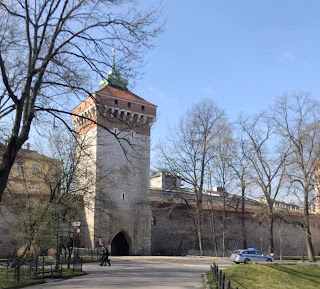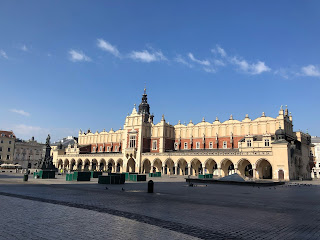Since I haven't had much occasion to get out and experience new things, I will use this week's edition of the blog to go through some of the fun phrases I hear. These have been compiled mostly from my ongoing Toastmaster's meetings and of course my colleague.
Let's start with some Polish words and phrases:
- Smacznego is the Polish form of Bon Appetite and is said before every meal. Even if you see someone eating a snack you might call out a smacznego in their direction. One time (pre-Coronavirus) Cameron and I were walking along a fairly empty street eating ice cream and a random middle-aged man shouted "smacznego" in our direction. It is derived from the word smak, which means "taste." A Polish coworker asked me what the English equivalent is, and I couldn't think of anything, other than perhaps "enjoy your meal." I think smacznego will be making its way back home with me to the US.
- Another meal tradition here is to thank everyone before leaving the table. We take lunch as a group at work (or at least when we aren't working remotely) and everyone waits patiently until the last person finishes. Then, someone makes a show of looking around and asking "are we done?" to which everyone agrees and says "thank you" or "dziękuję" as they get up. The same holds true at the close of a meeting (in person or virtual). I was even on a 50+ Hangouts meeting on Thursday and at least half of the participants said "dziękuję" before signing off.
- Over many years, I have developed my response to sneezes. The first sneeze gets a German "Gesundheit," sneeze two is responded to with "bless you," and then if there is a third sneezes the Spanish "salud" comes out. I am trying to very quickly break the Gesundheit habit, because I get the sense that casually speaking German is somewhat frowned upon. The Polish equivalent is "na zdrowie" which literally translates to "for health." It's the same phrase used to cheers people at the bar.
- Throughout the day, I hear my coworkers say "czyli." It's typically followed by a long pause or is repeated. It seems to be used as a filler word in the same way I catch myself repeating "so" unnecessarily. I asked what it means, and my coworkers said it works like "therefore" or "or," depending on the situation. It's kind of fun to say, and I've caught myself just quietly repeating "czyli, czyli..."
- Proszę bardzo literally translates to "you're very welcome" or "please very much." You'll hear it in many casual transactional conversations at the grocery store or a restaurant to refer to both the please and the "here you go" senses of the phrase. Although we might say "you're very welcome" in English, we don't go around casually dropping a "pretty please" at the bank.
There are also a number of unusual English phrasings that I hear people use often that I find quite charming:
- Do we have villages in the United States or do we always refer to them as towns, regardless of the citizenship count? I feel like I've only heard Americans talk about villages when they are referring to places outside of the US or in Native American lands. Here, if someone want's to tell you about where they are from, and it's not one of the 10 largest cities, they likely will say "I am from a small village." I even heard someone refer to Paris as a village, although I think they were just being funny.
- Working from home means a lot of Google Hangouts chats. I'm learning that my America ways of just launching right into the meat of something in a new chat is probably pretty jarring for my colleagues. I need to start developing a habit of asking "may I have a question?" before actually launching into the question.
- All written work communication is much more formal, and I especially enjoy the email salutations and closings. Emails often are addressed to "Dear ____" or "Dears" if it is to multiple recipients. Whereas I'm used to closing my emails with a "thank you" I'm learning that thanks are only given after receiving the requested information; the more appropriate phrase is "thank you in advance." More commonly, the email ends with a "kind regards" or "best regards" instead.
- "For example" comes up far more often than it does among native English speakers. I think it's because American's are more likely to use "like" instead of the more formal "for example."
- I haven't heard this much, but Cameron's coworkers are apt to refer to groups of people as being "tribal." I think that phrases is avoided in the US, or at least in Washington, because tribes are exclusively used in reference to Native Americans.
- Colleague is used much more regularly here; I don't think I've heard anyone refer to someone as their coworker. To me it sounds very formal to speak of one's colleagues.
I'm happy to say that I've notice my Polish language skills improving. When I'm in the shower I try to think of what I would say in fictitious situations, and more often than not I can think of enough Polish words to get my point across. Because all of these conversations take place in my own mind, there's a good chance that I'm using a German or Spanish word as a filler and not even realizing it. I know the opposite is starting to become true, and if I try to think of how I would say something in Spanish or German I can now only think of the Polish words. I'll take that trade off, and I hope to continue to pick up on fun Polish words and phrases to share in the future.
Working out from home, using wine bottles as weights.
Working from home every day means more TV time. I was watching Va Banque, the Polish version of Jeopardy, while making dinner the other night.
Parks are now off-limits. You can see the red-and-white caution tape blocking off this space.
The streets are super empty. I only saw maybe a dozen people in total when I walked 20 minutes to the bigger grocery store this morning.
Pretty much the only cars you see are the police. Here you can see two police officers patrolling Planty park and a police car patrolling in the other direction.
The only other person in the market square was a guy in a neon-yellow work vest taking drone footage of Old Town. Drone's aren't allowed in the city so I think he was on official government business.






No comments:
Post a Comment